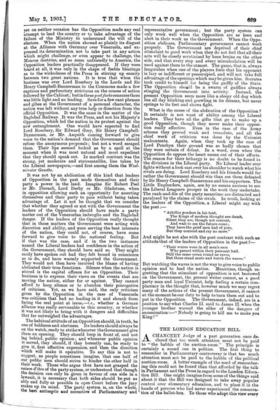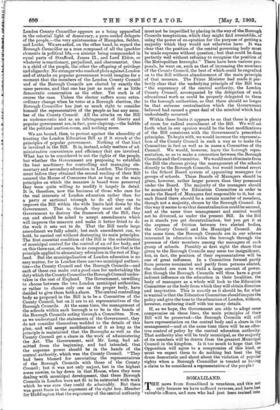THE LONDON EDUCATION BILL.
A. CHANCERY Judge of a past generation once de- clared that too much attention must not be paid to " the babble of the auction-room." The principle is certainly a sound one in politics. The first thing to remember in Parliamentary controversy is that too much attention must not be paid to the babble of the political auction-room. A better example of the need of remember- ing this could not be found than that afforded by the talk in Parliament and the Press in regard to the London Educa- tion BR One might imagine from some of the things said about it that the Bill was designed to take away popular control over elementary education, and to place it in the hands of persons who had never experienced the consecra- tion of the ballot-box. To those who adopt this view every London County Councillor appears as a being apparelled in the celestial light of democracy, a pure-smiled delegate of the people,—the very quintessence of Hampden, Selden, and Locke. We are asked, on the other hand, to regard the Borough Councillor as a man composed of all the ignobler elements in political life,—a sinister being compounded in equal parts of Strafford, James II., and Lord Eldon, or whatever is reactionary, prejudiced, and obscurantist. One is a child of the people, the other the offspring of privilege a,nd oligarchy. No stranger who reads of plots againstLondon and of attacks on popular government would imagine for a moment that the members of the London County Council and of the Borough Councils are elected by exactly the same persons, and that one has just as much or as little democratic consecration as the other. Yet such is of course the case. Unless the elector suffers some extra- ordinary change when he votes at a Borough election, the Borough Councillor has just as much right to consider himself the representative of the people as has any mem- ber of the County Council. All the attacks on the Bill as undemocratic and as an infringement of liberty and popular government are, in fact, pure claptrap,—the babble of the political auction-room, and nothing more.
We are bound, then, to protest against the absurdity of treating the London Education Bill as if it struck at the principles of popular government. Nothing of that kind is involved in the Bill. It is, instead, solely matters of ad- ministrative convenience and efficiency that are involved. What has to be considered is not the rights of the people, but whether the Government are proposing to establish the best machinery for controlling and managing ele- mentary and secondary education in London. The Govern- ment before they obtained the second reading of their Bill assured the House of Commons that as long as the main principles on which the measure is based were preserved they were quite willing to modify it largely in detail. It is, therefore, now the business of those who care for the real interests of London education rather than for a party or sectional triumph to do all they can to improve the Bill -within the wide limits laid down by the Government. That is, though they must not ask the Government to destroy the framework of the Bill, they can and should be asked to accept amendments which will improve the measure and make it better fitted to do the work it sets out to do. That the Bill needs large amendment we fully admit; but such amendment can, we hold, be carried out without destroying its main principles. The first essential condition of the Bill is the substitution of municipal control for the control of an ad hoe body, and on this there can, of course, be no compromise, for that is the principle applied to elementary education in the rest of Eng- land. But the municipalisation of London education is no easy matter, for in London there are two municipal authori- ties—the County Council and the Borough Councils—and each of these can make out a good case for undertaking the duty which the County Council or the Borough Council under- takes in the rest of England. The Government, unwilling to choose between the two London municipal authorities, or rather to choose only one as the proper body, have decided to give them both a share. The central controlling body as proposed in the Bill is to be a Committee of the County Council, but on it are to sit representatives of the Borough Councils. At the same time, the management of the schools within each borough is to be in the hands of the Borough Councils acting through a Committee. Now, as we understand the statements of the Government, they do not consider themselves wedded to the details of this plan, and will accept modifications of it so long as the principle is maintained that the Boroughs as well as the County Council get a share in the work of administering the Act. The Government, said Mr. Long, had ad- mitted from the beginning, and had intended, that the supreme power should be in, the hands of the central authority, which was the County Council. " They had been blamed for associating the representatives of the Borough Councils with those of the County Council; but it was not only unjust, but in the highest sense unwise, to lay down in that House, when they were dealing with municipal development, that these Borough Councils in London were not fit to be entrusted with work which he was sure they could do admirably. But there was great force in the argument of the right hon. Member four Haddington, that the supremacy of the central authority must not be imperilled by placing in the way of the Borough Councils temptations, which they might find irresistible, of using the power of co-optation for the purpose of getting a, majority. which they would not otherwise have. It waa clear that the position of the central governing body must be made supreme without question ; but that could be done perfectly well without refusing to recognise the position of the Metropolitan boroughs." There have been various pro- posals, he went on, such as that of increasing the numbers of the County Council, the best of which could be engraft on to the Bill without abandonment of the main principle of that measure. The Prime Minister had made it per- fectly clear that the underlying principle of the Bill was " the supremacy of the central authority, the London County Council, accompanied by the delegation of such educational work as could be properly delegated to them to the borough authorities, so that there should no longer be that extreme centralisation which the Government believed had caused a great deal of the mischief which had undoubtedly occurred."
Within these limits it appears to us that there is plenty of room for radical amendment of the Bill. We will set forth what in our opinion would be the best modifications of the Bill consistent with the Government's prescribed principles. To begin with, we would increase the representa- tion of the County Council in such a way as to make the Committee in fact as well as in name a Committee of the Council. We would, however, leave the borough repre- sentation, so as to make a connection between the Borough Councils and the Committee. We would next eliminate from the Bill the clauses giving the management of the schools directly to the Borough Councils, but would instead revert to the School Board system of appointing managers for• groups of schools. These Boards of Managers should be given, however, rather larger powers than they possessed under the Board. The majority of the managers should be nominated by the Education Committee in order to make the Board of Managers feel responsible to it, but on each Board there should be a certain number of members, though not a majority, chosen by the Borough Council. In this way it seems to us that decentralisation could be secured, and at the same time management and control would not be divorced, as under the present Bill. In the Bill as it stands you get decentralisation, but you get it at the expense of friction between two elected bodies, the County Council and the Municipal Council. At the same time, the Borough Councils are in our scheme interested in education within the borough through the presence of their members among the managers of each group of schools. Possibly at first sight the share thus given to the Borough Councils may seem too insignificant, but, in fact, the position of their representatives will be one of great influence. In a Committee formed partly from persons nominated and partly from persons elected, the elected are sure to wield a large amount of power. But though the Borough Councils will thus have a great indirect influence on the education in their localities, the body of managers as a whole will look to the Education Committee as the body from which they will obtain direction and inspiration. This is exactly as it should be, for what is wanted is that the Education Committee should inspire the policy and give the tone to the education of London, without, however, cumbering itself with too many details.
If, as we hope, the Government are able to adopt some compromise on these lines, the main principles of their Bill will be preserved—the Borough Councils will still have representation on the central body and a share in the management—and at the same time there will be an effec- tive control of policy by the central education authority. That authority also will be truly municipal, as the majority of its members will be drawn from the greatest Municipal Council in the kingdom. Is it too much to hope that the Opposition will agree to a compromise of this kind, or must we expect them to do nothing but beat the big drum democratic and shout about the violation of popular rights when a Borough Councillor is treated as having a claim to be considered a representative of the people ?











































 Previous page
Previous page